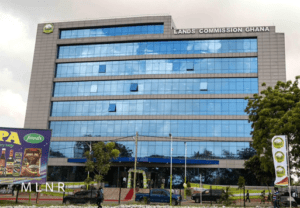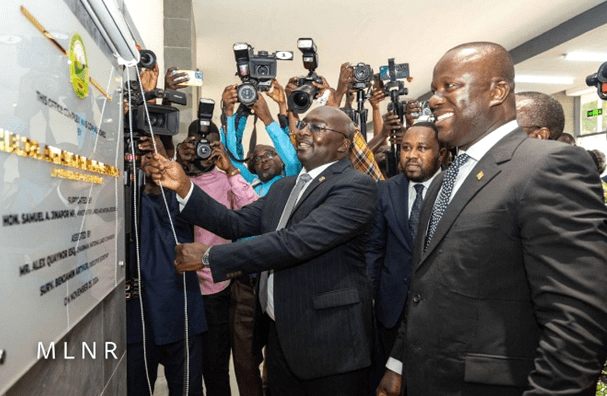By Kizito CUDJOE
Vice President Dr. Mahamudu Bawumia has underscored the critical role of public-private partnerships in advancing Lands Commission operations.
Speaking at the Commission’s new headquarters inauguration in Accra, Dr. Bawumia noted that such collaborations are crucial in driving digitalisation efforts and building other innovations to enhance land administration processes across the country.

The Lands Commission has made significant strides under its Land Administration Reforms programme. These include establishing six fully-digitised offices in the newly created regions -Ahafo, Bono East, North East, Oti, Savannah and Western North – and the Enterprise Land Information System (ELIS) launch, which allows the public to conduct remote searches in its records.
It is given these that the Vice President stressed a need for the Commission and other agencies to have requisite revenue to co-finance partnership initiatives.
Dr. Bawumia, for instance, revealed plans to allocate 3 percent of the country’s GDP (approximately GH₵30billion annually) from public sector spending to private sector initiatives, starting with the first budget under this strategy.
This approach aims to free-up fiscal space, enabling agencies like the Lands Commission to expand their Internally Generated Funds (IGF) by 50 percent and support critical projects such as digitalisation.
He noted that: “In the last eight years, government has been working to build a robust land administration anchored on three pillars: modern office infrastructure, digitisation and automation of business processes, and well-motivated and knowledgeable staff”.
Completing the new Head Office building equipped with state-of-the-art facilities, he said, is geared toward the first pillar of a robust land administration, demonstrating government’s commitment to creating a conducive environment for effective land management.
“This modern facility is not just a building – it’s a promise for the future of land administration in Ghana,” Dr. Bawumia stated.
He further urged stakeholders to continue leveraging technology and governance reforms to sustain progress in the sector.
“When we are able to achieve full digitalisation, it will prevent the mysterious disappearances of files, title-certificates and indentures, among others; it will stop the practice of ‘goro boys‘ extorting money from people who seek the Lands Commission’s services,” he asserted.
Additionally, he stated that it will prevent delays in land service delivery and, ultimately, result in a robust, efficient, transparent, responsive and orderly land administration.
He urged the Lands Commission’s management to continue investing in staff training, capacity building and motivation, as these are fundamental to sustaining the gains made.
The new Lands Commission head office facility features a 300-seat auditorium, a boardroom, three executive meeting rooms and a library, forming part of a broader infrastructure development initiative aimed at enhancing service delivery in the sector.
The Commission has also inaugurated a regional office for the Greater Accra Lands Commission, further geared toward improving operations nationwide.
The Minister of Lands and Natural Resources, Samuel Abu Jinapor, disclosed that a new Tema District Office complex for the Commission is also on track for completion by first-quarter next year.
Meanwhile, the Commission plans to construct 12 additional regional offices across the country. These projects aim to provide a conducive working environment for staff, enhance efficiency and improve accessibility for clients across Ghana.
He stressed that the ministry, working with the Commission, has “fostered collaborative partnerships with experts from the private sector. “Through these partnerships, we are advancing toward comprehensive Land Administration Reform that will strengthen the Lands Commission’s capacity to address current and future challenges effectively.”
Recognising the adverse consequences of ineffective, fraudulent and weak land administration, he called for collective efforts to build on achievements so far made.
He also asserted the need to continue and complete digitisation and digitalisation of the Lands Commission’s records and operations – and review the National Land Policy of 1999 among others.
“We must all work together to build a robust and functioning land administration in Ghana, which will jettison the usual inefficiencies, fraud and delays,” he stated.










